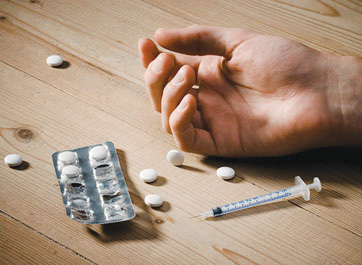Aetna Labor Forum March 28 will examine impact of, and solutions to, the opioid crisis
By TIM ROWDEN
Editor

“Our Nation is in the middle of a war against the opioid crisis,” Mike Louis, president of the Missouri AFL-CIO said in a recent email to union leaders. “The members and families of Organized Labor are not excluded from this serious problem.”
Louis is encouraging union members to attend the Aetna Labor Forum on Opioid Health Thursday, March 28, from 8 a.m. to noon at SMART Sheet Metal Workers Local 36 Union Hall, 2319 Chouteau Ave., St. Louis, MO 63103.
The forum will explore the causes of the opioid epidemic, its impact on local communities and Labor members throughout the U.S., and how local Labor leaders other public and private entities can collaborate to address this devastating crisis.
“If you have not been personally affected by this disease, we all know someone who has,” Louis said. “This is a problem that we all need to fight.”
FORUM PARTICIPANTS
Forum participants will include:
-
- Pat White, president of the Greater St. Louis Labor Council, representing 80,000 union members in the St. Louis Area
- Dr. John Gaal, retired director of training and workforce development for the St. Louis-Kansas City Carpenters Regional Council
- Spring Schmidt, co-director of public health, St. Louis County
- Chad Sabora, co-founder and executive director, Missouri Network for Opiate Reform and Recovery
- Robert Riley II, co-founder, Missouri Network For Opiate Reform and Recovery
- Ted Mannion, director of business development, AVIARY drug and alcohol recovery treatment center
- Stacie Zellin, communications and outreach coordinator, National Council on Alcoholism and Drug Abuse (NCADA)
- Dr. Ann Marie Dale, associate professor of medicine and occupational therapy at Washington University School of Medicine
- Frank J. D’Antonio, market president of Aetna’s Eastern Missouri and Southern Illinois health plans
- Brent Hunter, vice president of Public & Labor Segment sales, Aetna
- Dr. Grant Tarbox, senior medical director, Aetna national accounts
GUARDIAN ANGELS
Aetna has taken a leading role in combating the opioid crisis.
“Health care should be personal, and it should help us during our most vulnerable, difficult times,” Aetna Chairman and Chief Executive Officer Mark T. Bertolini wrote in an article for the Labor Tribune last October. “There are few instances when this type of support is more necessary than when people end up in the emergency room because of a problem they can’t control any more.
“Unfortunately, we are seeing this scene play out more and more frequently across the country,” Bertolini said. “Emergency department visits for opioid overdoses rose 30 percent in all parts of the United States from July 2016 to September 2017, according to the Centers for Disease Control and Prevention.
Aetna recently launched the Guardian Angel program members during that critical time.
As soon as Aetna learns a member has had an opioid-related overdose, a specially trained case manager reaches out to educate that person on treatment options in their area and nearby support services. More than anything else, they can serve as a lifeline for members and their families.
“Through our Guardian Angel outreach, we are seeing the widespread nature of this epidemic: Individuals as young as 18, up to those in their 60s, from every corner of the country. But we are also seeing people who want help. We have been able to initially engage with 40 percent of the people that we have reached out to, which is two to three times greater than our usual rate for telephone-based care management programs,” Bertolini said.
“We don’t just need to do more – we need to think differently about how to solve this problem,” he added. “We have to connect with people during the times that they are most receptive to help, such as after an overdose.”
To register, call (913) 202-6111.


Leave a Reply